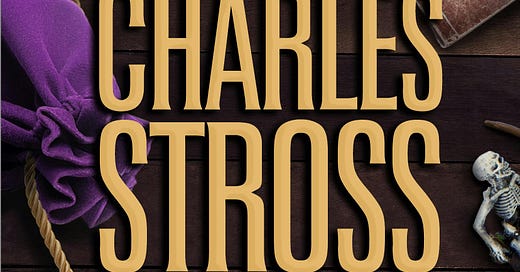I am a big fan of spy novels. Mick Herron’s Slow Horses series is the most recent addition to my pantheon of beloved spy books, but I’ve also adored the works of John le Carré and other masters of the genre. For the longest time, I craved something in the fantasy or science fiction genres that captured those vibes and did it well. Then, a friend recommended Charles Stross’ Laundry Files series, and I’ve been hooked ever since. It perfectly captures the suspense and drudgery of classic spy novels while adding an urban fantasy/horror twist. What if there was a secret branch of British Intelligence that specialized in battling occult threats—like cultists, wizards, vampires, and Lovecraftian entities? Enter the Laundry, the secret intelligence branch that has been doing just that for thirteen books, most recently in A Conventional Boy.
A Conventional Boy is different from most of the other Laundry Files books because it doesn’t follow someone working in or adjacent to the Laundry. Instead, it follows Derek, a young man who was just playing DnD with his friends in the ’80s when he got swept up in the Satanic Panic. By the time the Laundry realized he wasn’t actually a cultist (despite having some magical talent), it was too late—they kept him locked up in Camp Sunshine, a secret deprogramming center for cultists. Twenty-some years later, Derek learns there’s a tabletop games convention happening nearby and decides it’s time to break out and meet his long-time play-by-mail group. Unfortunately for Derek—and maybe humanity—there’s an actual group of cultists planning to use the convention for nefarious purposes. Now, Derek will have to use the knowledge he’s gained from both his tabletop RPGs and his years at Camp Sunshine to maybe save the world.
I really enjoyed A Conventional Boy. After the last several Laundry Files books, the series’ world has grown increasingly complex, so it was refreshing to have an installment that felt accessible even to someone who’s never read a book in the series before. Derek was a great viewpoint character for this because, like the reader, he’s an outsider to much of the series’ overarching drama. He also served as a fantastic “fish out of water” character, and I loved his demeanor as he slowly realized he’d found himself in a situation uncannily similar to what he’d been accused of all those years ago.
The strongest element of this book, however, was Stross’ portrayal of convention culture and its inherent weirdness. As longtime readers of Kaiju & Gnome will know, these are spaces Ed and I have spent some time in ourselves, and Stross absolutely nailed the occasional oddity of them. Reading about Derek and his friends, it was easy to imagine Ed and me in similar groups, having similar experiences (minus the insurgent eldritch entities). The eldritch game debut at the heart of the book’s plot reminded me of my own bewilderment at events like the Lorcana line at GenCon 2023 or the general vibes of the BookCon I attended during my Chicago days—specifically the one where friends worried I might join a cult there “for the lols.” I could’ve read a much longer novel about Derek navigating a secretly infernal board game convention because Stross made that part of the story so believable and nostalgic.
Between its characters and setting, A Conventional Boy gets high marks from me. It’s a quick read (under 150 pages), and I powered through it in an afternoon. If you’re a fan of the Laundry Files, you’ll find a lot to love here. If you’ve never read any of these books before, this is a great place to start. After reading it, I suspect you’ll feel compelled to go back and devour the rest of the series.



